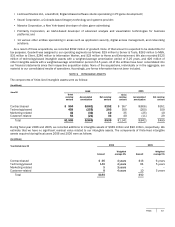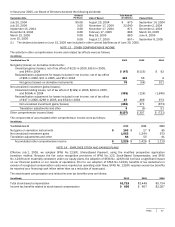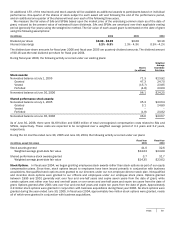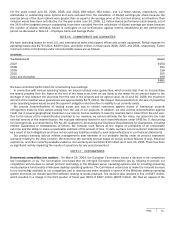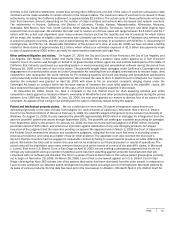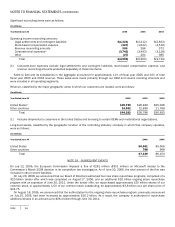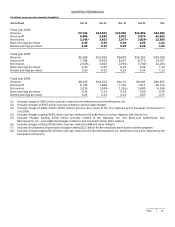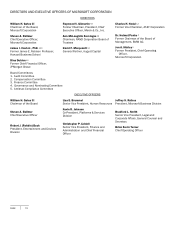Microsoft 2006 Annual Report Download - page 64
Download and view the complete annual report
Please find page 64 of the 2006 Microsoft annual report below. You can navigate through the pages in the report by either clicking on the pages listed below, or by using the keyword search tool below to find specific information within the annual report.
PAGE 63
similarly to the California settlement, except that, among other differences, one-half of the value of vouchers unissued to class
members will be made available to certain schools in the relevant states. The maximum value of vouchers to be issued in these
settlements, including the California settlement, is approximately $2.5 billion. The actual costs of these settlements will be less
than that maximum amount, depending on the number of class members and schools who are issued and redeem vouchers.
The settlements in Arizona, California, the District of Columbia, Florida, Kansas, Massachusetts, Minnesota, Montana,
Nebraska, New Mexico, New York, North Carolina, North Dakota, South Dakota, Tennessee, Vermont, and West Virginia have
received final court approval. We estimate the total cost to resolve all of these cases will range between $1.5 billion and $1.7
billion, with the actual cost dependent upon many unknown factors such as the quantity and mix of products for which claims
will be made, the number of eligible class members who ultimately use the vouchers, the nature of hardware and software that
is acquired using the vouchers, and the cost of administering the claims process. In accordance with SFAS No. 5, Accounting for
Contingencies, and FIN No. 14, Reasonable Estimation of the Amount of a Loss, at June 30, 2006, we have recorded a liability
related to these claims of approximately $1.2 billion, which reflects our estimated exposure of $1.5 billion less payments made
to date of approximately $300 million, primarily for administrative expenses and legal fees.
Other antitrust litigation and claims. On August 27, 2004, the City and County of San Francisco, the City of Los Angeles, and
Los Angeles, San Mateo, Contra Costa, and Santa Clara Counties filed a putative class action against us in San Francisco
Superior Court. The action was brought on behalf of all governmental entities, agencies, and political subdivisions of the State of
California that indirectly purchased our operating system or word processing and spreadsheet software during the period from
February 18, 1995 to the date of trial in the action. The plaintiffs sought treble damages under California’s Cartwright Act and
disgorgement of unlawful profits under its Unfair Competition Act resulting from our alleged combinations to restrain trade, deny
competition, and monopolize the world markets for PC operating systems and word processing and spreadsheet applications
(and productivity suites including these applications). We removed the case to the U.S. District Court for Maryland. Our motion to
dismiss the complaint was granted on April 18, 2005 with leave to file an amended complaint alleging claims under the
Cartwright Act based on conduct within the four-year statute of limitation the court ruled applies to the plaintiffs’ claims. We
have obtained final approval of settlement of this case, which resolves all claims asserted in the lawsuit.
On November 12, 2004, Novell, Inc. filed a complaint in the U.S. District Court for Utah asserting antitrust and unfair
competition claims against us related to Novell’s ownership of WordPerfect and other productivity applications during the period
between June 1994 and March 1996. On June 10, 2005, the trial court granted our motion to dismiss four of six claims of the
complaint. An appeal of that ruling is now pending and the case is effectively stayed during the appeal.
Patent and intellectual property claims. We are a defendant in more than 35 patent infringement cases that we are
defending vigorously. In the case of Eolas Technologies, Inc. and University of California v. Microsoft, filed in the U.S. District
Court for the Northern District of Illinois on February 2, 1999, the plaintiffs alleged infringement by the browser functionality of
Windows. On August 11, 2003, the jury awarded the plaintiffs approximately $520 million in damages for infringement from the
date the plaintiffs’ patent was issued through September 2001. The plaintiffs are seeking an equitable accounting for damages
from September 2001 to the present. On January 14, 2004, the trial court entered final judgment of $565 million, including
post-trial interest of $45 million, and entered an injunction against distribution of any new infringing products, but stayed
execution of the judgment and the injunction pending our appeal. We appealed and on March 2, 2005 the Court of Appeals for
the Federal Circuit reversed the decision and vacated the judgment, ruling that the trial court had erred in excluding certain
previous art evidence and ruling as a matter of law on other evidence. The appellate court also reversed the trial court’s
decision that the inventors had not engaged in inequitable conduct by failing to reveal material previous art while obtaining the
patent. We believe the total cost to resolve this case will not be material to our financial position or results of operations. The
actual costs will be dependent upon many unknown factors such as the events of a retrial of the plaintiff’s claims. In Microsoft
v. Lucent, filed in the U.S. District Court in San Diego on April 8, 2003, we are seeking a declaratory judgment that we do not
infringe any valid patent among a number of patents Lucent has been asserting against computer manufacturers that sell
computers with our software pre-installed. The first in a series of back-to-back trials on the various patent groupings is currently
set to begin on November 20, 2006. On March 28, 2006, Lucent filed a new lawsuit against us in U.S. District Court in San
Diego, claiming that Xbox 360 violates one of the patents that earlier had been dismissed from the older lawsuit. In response to
Lucent’s new complaint, we asserted patent infringement counterclaims accusing Lucent of infringing ten Microsoft patents by
its sales of various products. No trial date has been set in the new lawsuit. In Amado v. Microsoft, filed in U.S. District Court for


